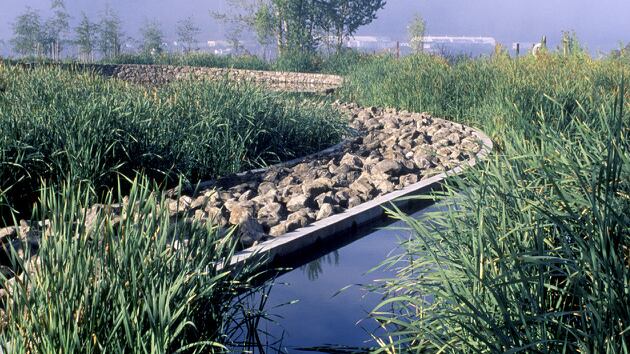In Portland, there are more than 3,600 rain gardens, which absorb and filter stormwater and slowly release it back into the soil. But few are as enchanting, large or old as the rain garden near the southern end of Cathedral Park in the St. Johns neighborhood.
“It’s definitely a showcase rain garden,” says Diane Dulken, spokeswoman for Portland’s Bureau of Environmental Services. “It’s an early example of green infrastructure in Portland. Since then, we’ve really ramped up.”
The rain garden, built in 1998, is enclosed within a crescent-shaped stone wall. To the untrained eye, it looks like the gathering place for a coven of witches. And the area within that wall is teeming with life: cattails and verdant grass sprout out of the marshy soil while animals make frequent guest appearances, from raccoons, deer and frogs to the occasional coyote, according to a security guard.
But beyond its beauty, the 23-year-old structure has an important job in managing the surrounding ecosystem. Stormwater runoff from about 50 acres of streets in St. Johns gathers in sedimentation manholes yards away from the garden. The manhole removes debris from the stormwater, which then flows through a rock-lined flume into the crescent-shaped garden.
The rain garden then slows and stores the water deposited from the flume. From there, plants and soil filter out pollutants. Slowly, the filtered water flows into the Willamette River, which is a stone’s throw away.
The rain garden can hold over 224,000 gallons of water—”enough water to fill about 5,000 bathtubs,” according to a nearby sign. If there is too much runoff for the garden to hold at once, the water is redirected elsewhere through a bypass pipe.
“Basically, we’re working with nature to act as a sponge,” Dulken says.
She also offered a word of advice to Portlanders: “The public can help maintain these gardens by just keeping your dog out of them,” she says. “They are not a place for dog poop. So enjoy them, but let them do their work.”

